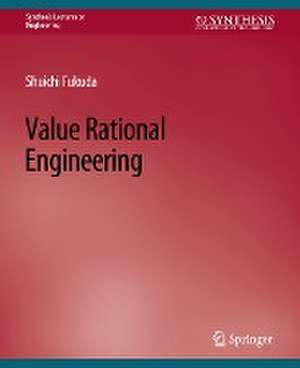Value Rational Engineering: Synthesis Lectures on Engineering, Science, and Technology
Autor Shuichi Fukudaen Limba Engleză Paperback – 21 aug 2018
Din seria Synthesis Lectures on Engineering, Science, and Technology
-
 Preț: 393.52 lei
Preț: 393.52 lei -
 Preț: 395.91 lei
Preț: 395.91 lei -
 Preț: 321.34 lei
Preț: 321.34 lei -
 Preț: 284.04 lei
Preț: 284.04 lei - 15%
 Preț: 500.59 lei
Preț: 500.59 lei -
 Preț: 397.38 lei
Preț: 397.38 lei - 15%
 Preț: 581.14 lei
Preț: 581.14 lei -
 Preț: 387.75 lei
Preț: 387.75 lei -
 Preț: 320.40 lei
Preț: 320.40 lei - 20%
 Preț: 594.83 lei
Preț: 594.83 lei - 17%
 Preț: 458.16 lei
Preț: 458.16 lei - 20%
 Preț: 588.21 lei
Preț: 588.21 lei -
 Preț: 396.42 lei
Preț: 396.42 lei - 15%
 Preț: 644.95 lei
Preț: 644.95 lei -
 Preț: 329.98 lei
Preț: 329.98 lei -
 Preț: 214.57 lei
Preț: 214.57 lei -
 Preț: 236.41 lei
Preț: 236.41 lei - 20%
 Preț: 331.25 lei
Preț: 331.25 lei -
 Preț: 320.40 lei
Preț: 320.40 lei - 15%
 Preț: 527.97 lei
Preț: 527.97 lei -
 Preț: 420.97 lei
Preț: 420.97 lei - 15%
 Preț: 583.61 lei
Preț: 583.61 lei -
 Preț: 352.63 lei
Preț: 352.63 lei - 15%
 Preț: 527.97 lei
Preț: 527.97 lei -
 Preț: 358.75 lei
Preț: 358.75 lei - 15%
 Preț: 526.35 lei
Preț: 526.35 lei -
 Preț: 221.25 lei
Preț: 221.25 lei - 18%
 Preț: 735.07 lei
Preț: 735.07 lei -
 Preț: 399.80 lei
Preț: 399.80 lei -
 Preț: 386.81 lei
Preț: 386.81 lei -
 Preț: 389.70 lei
Preț: 389.70 lei - 20%
 Preț: 295.74 lei
Preț: 295.74 lei - 15%
 Preț: 523.91 lei
Preț: 523.91 lei -
 Preț: 514.29 lei
Preț: 514.29 lei -
 Preț: 413.76 lei
Preț: 413.76 lei -
 Preț: 404.13 lei
Preț: 404.13 lei -
 Preț: 427.71 lei
Preț: 427.71 lei -
 Preț: 390.63 lei
Preț: 390.63 lei - 15%
 Preț: 640.06 lei
Preț: 640.06 lei - 15%
 Preț: 531.26 lei
Preț: 531.26 lei - 15%
 Preț: 528.80 lei
Preț: 528.80 lei - 15%
 Preț: 529.60 lei
Preț: 529.60 lei -
 Preț: 386.81 lei
Preț: 386.81 lei -
 Preț: 414.42 lei
Preț: 414.42 lei -
 Preț: 162.87 lei
Preț: 162.87 lei -
 Preț: 349.91 lei
Preț: 349.91 lei
Preț: 260.18 lei
Nou
Puncte Express: 390
Preț estimativ în valută:
49.78€ • 52.12$ • 41.19£
49.78€ • 52.12$ • 41.19£
Carte tipărită la comandă
Livrare economică 05-19 aprilie
Preluare comenzi: 021 569.72.76
Specificații
ISBN-13: 9783031793974
ISBN-10: 3031793978
Ilustrații: XV, 81 p.
Dimensiuni: 191 x 235 mm
Greutate: 0.19 kg
Editura: Springer International Publishing
Colecția Springer
Seriile Synthesis Lectures on Engineering, Science, and Technology, Synthesis Lectures on Engineering
Locul publicării:Cham, Switzerland
ISBN-10: 3031793978
Ilustrații: XV, 81 p.
Dimensiuni: 191 x 235 mm
Greutate: 0.19 kg
Editura: Springer International Publishing
Colecția Springer
Seriile Synthesis Lectures on Engineering, Science, and Technology, Synthesis Lectures on Engineering
Locul publicării:Cham, Switzerland
Cuprins
Preface.- Acknowledgments.- Introduction.- Big Shift in Engineering.- Value and Rationality: Traditional Engineering Definition.- Increasing Difficulty of Recognizing Product Quality Improvement.- Value and Rationality: Definitions in Other Fields.- Design--Another Form of Decision Making.- Importance of "Self".- Increasing Importance of Process Value.- Reliability to Trust.- Individual Products to Team Products--Individual Play to Team Play.- Strategy: Yesterday and Today.- Modularization: Product-Based to Process-Focused.- Sectors of the Economy.- Sharing Society.- The Connected Society.- New Horizons Are Emerging.- References.- Author's Biography.
Notă biografică
Shuichi Fukuda is Advisor to the System Design and Management Research Institute of Keio University, Japan and Professor Emeritus of Tokyo Metropolitan Institute of Technology and Tokyo Metropolitan University. He was a Research Associate at University of Tokyo, Associate Professor at Osaka University, Japan, Professor, Dean of Engineering and Dean of Library and Information Systems, Tokyo Metropolitan Institute of Japan, and Director of Government, Industry and University Collaboration Center, Tokyo Metropolitan Government. He was a Consulting Professor, and Visiting Professor at Stanford University, a Visiting Professor at West Virginia University, Cranfield University, UK, Osaka University, Japan, The Open University, Japan, and a Visiting Associate Professor at University of Tokyo, Japan. He is the editor of many engineering books, in addition to his own numerous research publications. He served as President of ISPE (International Society for Productivity Enhancement), Vice President of IEEE Reliability Society, Deputy Group Leader of Systems and Design, ASME, and Division Chair of Computers and Information Engineering, ASME. He is a Member of the Engineering Academy of Japan, Honorary Member of JSME, Glory Member of REAJ, and a Fellow of ASME, IEICE, and ISPE.
